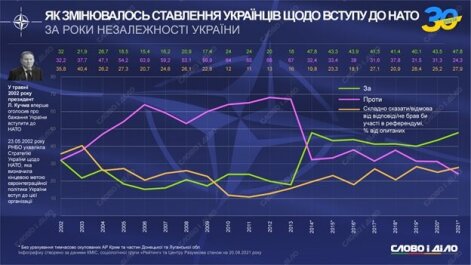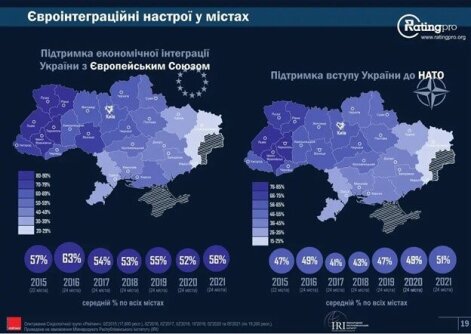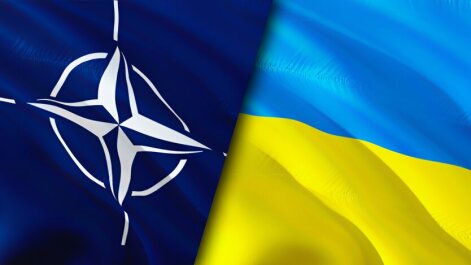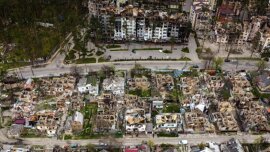For many years, since the 1990s, our country has been on the path to NATO. This path was not as fast and easy as it seemed then. Over the years, society has changed, the country has changed, not to mention the country's leadership. NATO and its view of Ukraine have changed during this time. The road to NATO has been a long and difficult process. So where does this path lead our country and society?
CHANGES IN PUBLIC MOOD
According to the Law of Ukraine № 2680-VIII of February 7, 2019 , the Constitution of Ukraine sets a strategic course for full membership in the European Union and the North Atlantic Treaty Organization, better known as NATO. These changes in the Constitution became another milestone of our country's long path towards integration with NATO and became especially important after the beginning of the Russian aggression against Ukraine in 2014.
It was Russia's military aggression that became the powerful catalyst that critically influenced public opinion regarding the need to join NATO. Thus, in 2002, the number of Ukrainians who, according to opinion polls, supported joining NATO was almost the same as those who opposed it, at around 32% to 32%. In the following years, support for the idea of NATO membership among Ukrainians decreased significantly to 15 -18% of respondents "for" with 64-67% "against". But since 2014, the situation has changed dramatically and almost 48% of respondents support the need for Ukraine's accession to NATO with 32% "against" (for comparison, in 2013 these figures were 18% and 67%, respectively).
Title: How attitude to joining NATO changed in Ukraine after the Independence

According to the analytical portal "Word and Deed"
However, starting in 2015, the positive attitude of Ukrainian citizens to joining NATO again begins to gradually decline to 40-42%, and only in the summer of 2021 this level rises again to almost 48%, resuming the results of 2014. While the level of “no support” reached its lowest level since 2021 since 2002 and amounted to only 24% of respondents (in 2014 this figure was 32%), according to a survey conducted by the Kyiv International Institute of Sociology (KIIS) of 8 until June 9, 2021 . And according to the latest poll by the sociological group "Rating" , in November 2021, 58% of Ukrainians were ready to support joining NATO.
Commenting on the situation, Volodymyr Horbach, a political analyst at the Institute for Euro-Atlantic Cooperation and an expert on Ukraine's foreign and domestic policy, noted that Ukrainian citizens see NATO primarily as a tool for protection against external aggression. If since 2015, when the probability of a major offensive by Russian troops has decreased significantly, at least in the opinion of most Ukrainian citizens, the trend of "finding a defender" has become less relevant, the popularity of Ukraine's accession to NATO has declined somewhat. But when Russia began threatening a military invasion in 2021, sending troops to the border and in occupied Crimea, the desire to be protected by NATO from external aggression grew again. "Few people remember this now," Volodymyr said. - “but the idea of Ukraine's membership in NATO enjoyed great support in the 1990s, at time of the so-called "Chechen wars". At that time, Ukrainian society wanted to defend itself with some external barrier. The wars are over - support has fallen. "In addition, public sentiment is affected by frustration with NATO's support for Ukraine. "Expectations from NATO on this issue have been significantly inflated both among the population and among politicians and high-ranking officials," the analyst said.
REGIONAL DIMENSION
But if the general attitude of the population towards the prospect of joining NATO is quite optimistic, then in the regional dimension it all looks a little different. Thus, according to the KIIS survey in June 2021, if in the west and in the central regions in the case of a referendum on Ukraine's accession to NATO the positive answer significantly outweighed the negative (66% vs. 9.4% and 53.2% vs. 18.7% respectively), in the south this ratio is already almost equal to the share (33.6% "for accession", 35.2% "against"). But the worst situation in this sense is in the east - only a quarter of respondents is ready to support the idea of joining NATO, despite the fact that almost half was against. And this without the temporarily occupied territories of Luhansk and Donetsk regions and the Autonomous Republic of Crimea!
The Seventh Ukrainian Municipal Survey , conducted in 2021 by the sociological group "Rating" in 24 regional centers of Ukraine, shows not the best results . The worst results were obtained in Mariupol, Severodonetsk.
Title: Attitude to Eurointegration in cities

At the same time, this trend is very constant, despite the fact that the eastern regions of the country are the most affected by Russian military aggression.
Volodymyr Horbach commented on the situation as follows: “Unfortunately, a large part of the inhabitants of the eastern regions, although the most affected by Russian aggression, still do not perceive this war as Russia's war against Ukraine. They perceive this difficult situation in which they find themselves as a kind of "space" or "world" war between Russia and the United States, which fell on their heads from somewhere outside. "
According to the expert, psychologically, many of these people are not ready to blame Russia, so they shift the responsibility to something else, distant, incomprehensible and hostile, which is perceived as NATO. "And of course, the influence of Russian propaganda, which, unfortunately, is very powerful, especially in these regions. Moreover, it is conducted by the most modern methods, using both classical television and radio broadcasting, as well as social networks and the Internet,” Volodymyr Horbach said.
Andreas Umland, a well-known German political scientist and expert on Russian ultra-nationalism, authoritarianism, European neo-fascism and comparative democratization, agrees that modern Russian propaganda greatly influences the sentiment of the people of the eastern and southern regions: “Russian propaganda is very powerful and effective. Russia is spending a lot of money on the information component of its hybrid war. Unfortunately, Ukraine loses very much in this field."
INFORMATION ACTIVITY AS THE MAIN TOOL
According to Andreas Umland, the fact that Ukraine hardly uses the opportunity to conduct information work in the Russian-speaking segment of the Internet, significantly weakens the impact on the minds of the population of eastern and southern regions of Ukraine, where Russian is widely used in everyday life. There is no interaction with those Russian-language information resources and bloggers who are in opposition to the current government in Russia and its policies, especially in relation to Ukraine.
"Yes, this is not an easy job, but only bans on Russian information resources and social platforms, such as Vkontakte or Odnoklassniki, will not solve the problem. We need to respond actively," said Andreas Umland.
In addition, according to the expert, the disconnection of analog television broadcasting in these regions negatively affected spreading of pro-Ukrainian comntent. "Not everyone, especially in small towns, gladly ran to buy T2 devices, when you can safely watch Russian analog television, which is well received even by old indoor TV antennas. The signal of Russian television is very strong, especially in the east and south. And now in the north of Ukraine as well,” he says.
Volodymyr Horbach does not completely agree with his colleague on this issue: "Unfortunately, neither Ukraine nor the Russian opposition forces do not have sufficient resources to fight Russian propaganda on social networks such as Vkontakte." This field is completely controlled by Russian propagandists and the authorities, and if any particular blogger even thinks that he is winning this information confrontation, he is unfortunately wrong.
Therefore, to play on this field, according to V olodymyr Horbach, will be a clear loss, because resources and opportunities are disproportionate. "But the information component is, of course, extremely important in the hybrid war that Russia is waging against our country. Against our country and, as we see, against the whole democratic world" he said.
In an interview with Ukrinform on 15 November this year, Acting Head of the NATO Office in Ukraine, Director of the NATO Documentation and Information Center in Ukraine Vineta Kleine, answered a journalist's question about the impact of Russian propaganda aimed at preventing accession of Ukraine in NATO, noted:
"Misinformation, malicious information attacks and propaganda are phenomena that all countries have faced. Therefore, one of the rules that everyone must follow is that society as a whole must realize that every day each of us is faced with misinformation, manipulation and fakes.
It is very important to think critically. That is why, as part of the NATO-Ukraine Hybrid War Platform, we are helping to organize media literacy courses for civil servants and the media. This is one of the platforms within which we work closely with Ukraine "
In addition, as V olodymyr Horbach noted, the mood of the population of the east and south is greatly influenced by the activities of pro-Russian political forces, which, unfortunately, continue to be active in our country and are especially popular in these regions. Opposing the formation of a positive attitude of the people of Ukraine to the idea of joining NATO and to the North Atlantic Treaty Organization itself is one of the key narratives of these political forces. "However, time is working against them. The younger generation is more modern, so the impact of this propaganda will gradually diminish, as we already see in the dynamics. The change of generations leads to a change of political views, but not as fast as we would like. This is a long way," the expert concluded.
So where does the path to NATO lead? What conclusions can be drawn?
First, it is obvious that we should not expect a rapid positive decision on this issue. What the Baltic states did relatively easily and quickly after the collapse of the Soviet Union, Eastern European countries such as Poland, Hungary, the Czech Republic, Slovakia, and finally Romania and Bulgaria will not be in Ukraine. There will be a long and rather contradictory path with ups and downs. And this is due not only to public opinion and politics of Ukraine itself, but also to many external factors, especially the factor of Russian aggression and uncertainty about the prospects of Ukraine's accession to some NATO countries. And the decision to admit a new member to the Alliance is based solely on the consent of all member countries. And no matter how much our politicians shout "When will we finally be admitted to NATO?, it will not speed up the process. You have to be prepared for a long and thorny path with many obstacles and problems.
Secondly, and perhaps most importantly, the path to NATO must be a path to unity in society. Only when unity on this issue is achieved, when there are no regions where the vast majority of the population will oppose our country's accession to NATO, and the level of support/disapproval of this paradigm will become dominant in society not only as "average room temperature", but in all regions of the country, we can talk about reaching a public consensus on this issue. Russia's information war, pro-Russian political forces, errors and weaknesses in Ukraine's information policy, insufficient NATO information activity in Ukraine (largely due to the Alliance's uncertainty about Ukraine's prospects) are factors that oppose the formation of such a consensus. At the same time, we should not dismiss those who now oppose Ukraine's accession to NATO, saying: "And there are more of us who are in favor of accession." This path does not lead to constructiveness and does not accelerate a positive decision. It is necessary to conduct active, audience-oriented, even targeted, informational work, primarily aimed at those regions and those people who are "against" or have not decided on this issue. Only when the path to NATO becomes a path to understanding and unity will it really lead us to the goal.
This article is funded by the NATO is People project, funded by the Government of the United Kingdom of Great Britain and Northern Ireland through the Ministry of Foreign Affairs and Commonwealth Affairs ("FCDO").

























